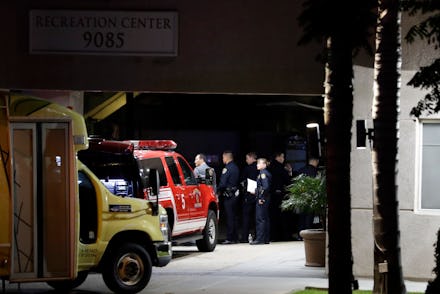Let's stop using a "broken heart" as an excuse for men's violent behavior

Men do not kill people over broken hearts.
They don't do what 49-year-old Peter Raymond Selis did in San Diego on Sunday, which is grab a gun and shoot indiscriminately into a crowd of people gathered near a pool, because they're "despondent" over a breakup with a woman. They don't call said woman, in the middle of wreaking havoc on strangers, and make her listen to the bloody rampage, because they're "distraught and depressed over the breakup," as Selis's family later told law enforcement.
They don't do what 37-year-old Steve Stephens did on April 16 in Cleveland, which is approach an innocent man while recording video on a phone, and then shooting that man dead, because he's reached his "breaking point" over a woman. They don't then upload that video to Facebook and lead police on a days-long manhunt because said woman is in any way culpable for that man's actions.
This is textbook domestic violence. And calling it anything but that almost ensures that it will happen again. They don't do it because they're broken-hearted. They do it because they're abusive men who've likely been abusive for a long time. It's too easy to glaze over "despondency" or "revenge" as motives for crimes that are, at their core, about violence against women.
Nearly 20 people on average are physically abused by their intimate partners per minute, according to the National Coalition Against Domestic Violence. That figure doesn't include the amount of emotional abuse that goes on within that same time frame or the incidents that go unreported, which experts estimate is 70% of all cases.
For black women, domestic violence is especially deadly. Though black women make up just 8% of the U.S. population, they constitute 22% of domestic violence homicides, according to the University of Minnesota's Institute on Domestic Violence in the African American Community. On April 10 in San Bernardino, 53-year-old Karen Smith was gunned down by her estranged husband Cedric Anderson, who walked into the school where she taught and fatally shot Smith and a child in her classroom.
But in too many of these cases, women wind up being blamed for their own abuse — either explicitly, like when people on Twitter and Facebook blamed Stephens's ex and tried to get him to stop his reign of terror, or implicitly, in the way that we report or talk about instances of domestic violence.
We seem to accept the idea that a broken heart is a legitimate motive for violence, either interpersonal violence or in cases of mass shootings like what happened recently in San Diego. But that reasoning ignores the real problem: Violence at home unchecked can lead to violence elsewhere. Unless we identify and act on early warning signs of abuse, we can't stop it. And in order to stop it, we first have to name it.